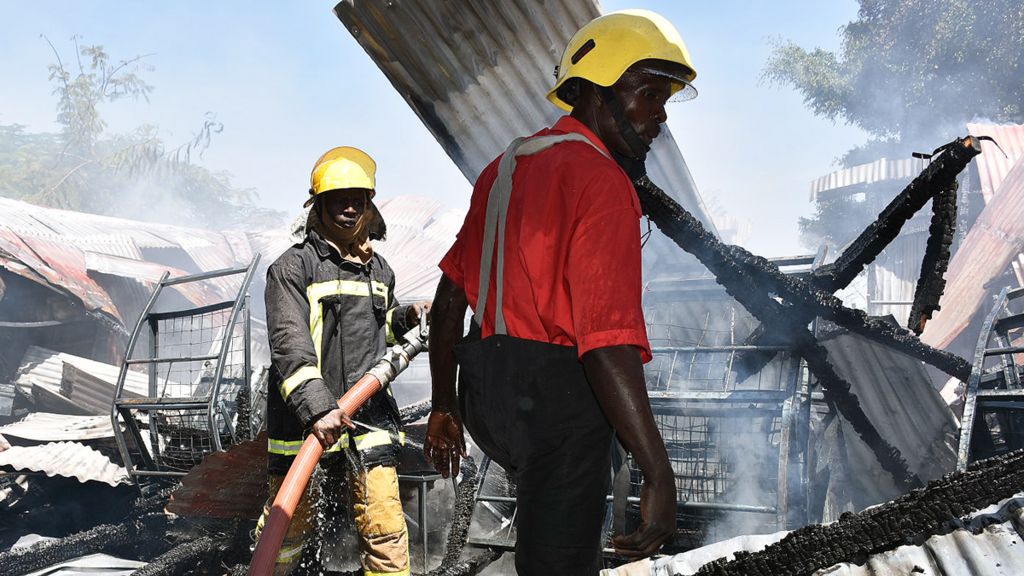ARTICLE AD BOX
 Image source, Michael Osewe
Image source, Michael Osewe
Fire officers tackle one of the many arson attacks on Kenyan schools last year
By Ashley Lime & Carolyne Kimbo
BBC News, Nairobi
A school dormitory in western Kenya burned down a few weeks ago and several students were arrested on suspicion of arson - just the latest instance of a devastating criminal pattern that has dominated the country's education system for more than 30 years.
Last year saw a particular spike in the number of boarding school arson attacks by the pupils, which students blamed on an intensified curriculum following time lost to the Covid lockdown. The second half of the year saw an average of three a week. The BBC has spoken to students whose schools have been set on fire to investigate what lies behind the regular attacks.
The names of the students have been changed
It was about 16:30 on a Sunday afternoon when someone on the school field spotted the fire. At first, Lillian wasn't too worried. It was just the matron burning rubbish, someone said. But before long, screaming students began streaming out of the school building. Smoke was pouring out of Lillian's dorm.
Lillian [not her real name], 15 at the time of the attack last October, was terrified. She knew her good friend was in the building having a nap.
"People were crying, they were traumatised… [I could see] smoke had covered the entire dorm."
They watched as students at Buruburu Girls High School - in the capital Nairobi - began jumping from the windows to escape.
Lillian doesn't know for sure what provoked the arson attack. But she claims that students were deeply unhappy about the amount of academic pressure they were under in the run up to national exams.
"We're usually in class by 4.30am every morning," Lillian told the BBC last November. Independent study then continued to 22:00, she said.
Image source, BBC/Yedeta Berhanu
Image caption,Lillian, studying at home in Nairobi
Boarding schools are the main educators of secondary school-aged children in Kenya - seen as a way of getting good quality subsidised education, and places where children can concentrate on their studies.
Another student, Mary, 16, confirmed that there had been no extra curricular activities last year, and said the academic schedule had been intense.
"We had to add more lessons to cover the syllabus in time… it was quite challenging."
Her mother confirmed that her daughter had complained of long hours and poor student-teacher relations.
The BBC asked Buruburu Girls High School to comment but it did not respond.
Kenya's boarding schools are educationally demanding, admits Dr Newton Mwangi, a former principal of Passenga Secondary School who retired last year.
"Nowadays a child who does not make a good score to take him or her to university is like a condemned child," he says.
Arson attacks are not a new issue in Kenyan boarding schools - the deadliest Kenyan school arson took place 20 years ago, killing 67 students in Machakos County, south-east of Nairobi.
The fires are particularly dangerous because they are usually lit in dormitories, as was the case in Lillian's school. Although her friend finally emerged through the fire exit unscathed, 59 of the girls were reported by local media to have received hospital treatment for smoke inhalation, minor burns, and fractures.
Such attacks have historically been debated only behind closed doors - the government refuses to share data with the media on the number of school arson attacks, or discuss the issue.
But in November 2021, the Ministry of Education issued a response to a parliamentary committee which had requested more information on the school arson crisis and revealed that there were 126 arson cases between January and November last year.
It revealed that 302 students had been arrested in connection with those incidents and of those, 41 had appeared in court accused of arson and destruction of property.
We don't know how many of those 41 were found guilty, because Kenyan courts restrict reporting on crimes involving children, children's lawyer Paul Muchiri told the BBC.
One of the few convictions we are aware of took place earlier this year. An 18-year-old was found guilty of manslaughter for starting a fire that resulted in the death of 10 students at Moi Girls High School in Nairobi in 2017 when she was 14. The student, only identified as TWG, was handed a five-year prison term.
Image source, Getty Images
Image caption,Requiem mass for girls who died in a fire at Moi Girls School, Nairobi, in September 2017
The Ministry of Education statement issued in November listed what it believed to be the reasons behind the arson epidemic, which included: overcrowding, poor teacher-student relations, drug abuse, and inadequate counselling services within schools. It suggested however that the fault did not just lie with academic institutions, remarking that parents were "overprotective" of their children when accused of misbehaviour, and that the law hindered teachers' ability to discipline pupils.
Its recommendations included recruiting professional school counsellors - but it also suggested "critically" examining the role of boarding schools in Kenya's education system.
Lillian not only missed nine days of school as a result of the destruction, but all students' families were asked to pay collective damages, a common policy according to local media reports. Lillian's mother shared a letter from the school with the BBC dated 5 November - five days after the fire - requesting 1,500 Kenyan shillings [£10] "for damages incurred". The family lives in a slum and she says this was a huge amount of money for the family to find.
The Ministry of Education did not respond to the BBC's request for an interview.
School arson is not unique to Kenya, says Elizabeth Cooper, a Canadian academic and anthropologist who has spent months in Kenya studying the issue.
But she says what is remarkable is its frequency, severity and collective nature.
"Many students participate, sometimes planning in advance, sometimes being coerced to participate by other students… [which] points to… this idea that there could be some consensus around the logic of using arson," she told the BBC.
Ms Cooper believes this might be because students feel as though setting fire to their schools is working to an extent, and that it might be time to consider a different approach to education in Kenya, which currently relies on "trying to strong-arm [students] into compliance". The potential to shift thinking on this might lie with teacher training colleges, she says, but parents, governors and politicians would all need to be brought on board, meaning it will take time "to try shifting the culture of how education is done".

 2 years ago
22
2 years ago
22








 English (US) ·
English (US) ·